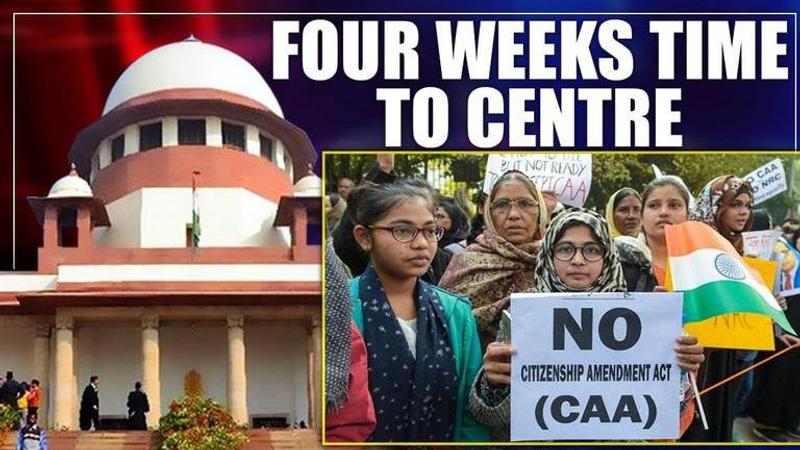Published 13:10 IST, January 22nd 2020
SC refuses to pass interim stay order on CAA; gives 4-week time to Centre for reply
Concluding the hearing on a batch of pleas challenging the constitutional validity of the CAA, the SC on Wednesday gave the Centre four weeks to respond.

Concluding the hearing on a batch of pleas challenging the constitutional validity of the Citizenship Amendment Act (CAA), the Supreme Court on Wednesday gave the Centre four weeks to respond. . On Assam and Tripura, the top court said that it will hear the petitions separately, as the problem with CAA in these two states is different from the of the country.
Making it clear that it will not grant any stay on the CAA without hearing the Centre, a bench headed by Chief Justice SA Bobde also restrained all high courts from hearing pleas on CAA till it decides the petitions. The Bench consisting of CJI Bobde, Justices S Abdul Nazeer and Sanjiv Khanna, will take up the matter after five weeks.
While arguing in the apex court, Attorney General KK Venugopal, appearing for the Centre, told the bench that the government has been given copies of around 60 pleas out of the 143 petitions. He said it wanted time to respond to pleas which have not been served on it. Appearing on behalf of the petitioners, Senior advocate Kapil Sibal urged the bench to put on hold operation of CAA and postpone exercise of the National Population Register (NPR) for the time being. He also urged the court to refer the case to a constitutional bench.
What is the Citizenship Amendment Act?
The Citizenship (Amendment) Act (CAA) seeks to grant citizenship to non-Muslim migrants belonging to Hindu, Sikh, Buddhist, Christian, Jain and Parsi communities who came to the country from Pakistan, Bangladesh and Afghanistan on or before December 31, 2014. President Ram Nath Kovind gave assent to the Citizenship (Amendment) Bill, 2019 on December 12, turning it into an Act.
Petitions against the CAA
The Supreme Court was hearing more than 140 pleas that challenged the CAA. IUML said in its plea that CAA violates the fundamental Right to Equality and intends to grant citizenship to a section of illegal immigrants by making an exclusion on the basis of religion.
The plea filed by Congress leader Jairam Ramesh said the Act is a "brazen attack" on core fundamental rights envisaged under the Constitution and treats "equals as unequal". On similar lines, the Kerala government in its plea has stated that the act violates "Articles 14, 21, and 25 of the Constitution of India". It went on to state that it is violative of the basic structure principle of secularism as well. Kerala government is the first state government to move the top court against the amendment Citizenship Act.
Other petitions in the Court includes those by RJD leader Manoj Jha, Trinamool Congress MP Mahua Moitra, AIMIM leader Asaduddin Owaisi. Several other petitioners include Muslim body Jamiat Ulama-i-Hind, All Assam Students Union (AASU), Peace Party, CPI, NGOs 'Rihai Manch' and Citizens Against Hate, advocate M L Sharma, and law students have also approached the apex court challenging the Act.
Anti-CAA resolution
The Kerala government became the first state govt to pass a resolution against CAA. On its heels, the Punjab government too passed a resolution demanding to scrap the contentious law. Next, Rajasthan and West Bengal have declared it will pass a resolution against the law on January 24, the first day of its next session. Several states like Maharashtra, Madhya Pradesh, Telangana, and other non-BJP states are mulling the same, while openly opposing CAA-NRC-NPR.
Updated 13:10 IST, January 22nd 2020




